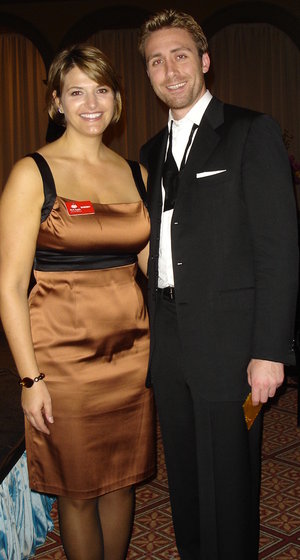
Sherry Truhlar and Philippe Cousteau, who attended the Capital Hospice gala here in Washington, D.C. — and made a generous donation of an item. He attracted some attention, especially from the women. 😉
Wondering how to get celebrities to your party?
Occasionally I’ll have a conversation with a non-profit attempting to build awareness of their gala. They want to invite a well-recognized actor or musician to the event.
The charity’s goal is multifaceted.
- The presence of a star could draw others to attend their gala
- The star himself might donate to the auction, thereby raising funds in a more direct way.
The close passing of both Farrah Fawcett and Michael Jackson – both active in charitable causes – renewed interest in this topic among my clients.
Contacting and cementing a relationship with a star can be a lengthy process, so targeting the right celebrity upfront is important. It would be a waste of time to send correspondence to a star who has no interest in your cause.
1. If someone knows someone, pursue that path first. If a committee member went to school or knows a friend of Celebrity XYZ, start there. Have them make the call. I’ve worked a few auction galas that had celebrities in attendance because of that connection.
(That said, when our charity auctions have a celebrity in attendance, it tends to be a celebrity of the small screen, not silver screen.)
2. If you don’t have that warm lead, a critical point is to research celebrities online before you reach out. Only contact those who have a direct tie to your charity’s mission.
There are thousands of celebrities. You can’t chase them all! Focus your efforts.
Here are questions to consider:
- Where was the celebrity raised?
- What city do they identify as their “home town?”
- Were /are they close to anyone who has a particular condition or illness (such as a brother with Down’s Syndrome, or a Mom recovering from breast cancer)?
- Do they themselves have a unique condition, like dyslexia or diabetes or a transplant?
- Have they been photographed attending any specific charitable events?
The answers can provide clues to whether the celebrity is a logical person for you to approach.
For instance, actress Farrah Fawcett’s charities of choice were cancer and domestic violence organizations. Both of those were part of her life experience so she donated to them later and raised public awareness of both.
Michael Jackson’s philanthropy rewarded children’s charities — and is it any wonder, given that his own rocky childhood was widely documented? His philanthropy reflected a desire to improve the childhood of someone else.
Though both celebrities were generous, Fawcett’s contributions pale in comparison to Jackson’s, whose own donations earned him a listing in the 2000 Guinness Book of World Records for most charities supported by a pop star. Though he enjoyed an elaborate lifestyle, he was just as quick to lavishly donate his time or money to causes which caught his heart.
Take the time to learn the backgrounds of your targeted celebrities and understand their unique life circumstances.
Contacting a public figure might prove to be incredibly worthwhile for your organization. It could develop into a long-term relationship. But spend time time upfront researching individuals before you pick up the phone. Celebrity charity rarely happens overnight.
Love the experience and tips you bring to nonprofits. We’re always looking to pass along helpful hints like these to the organizations using our he hCard Fundraising Program. Thanks and we’ll keep following you!
Thanks for stopping by, Wendy! If you’re not on the “Benefit Auction Ideas” list, I encourage you to get on that, too. That’s where I announce free teleclasses and other resources designed to help Auction Chairs.
Hi: I would like to know, where do I start. Especially if the organization is very small but wants to have this boost, with little resources, how do I initiate this effort?
Thank you.
Andrila.
Thanks for stopping by the blog, Andrila.
Because of the time it often takes to secure a celebrity, I’d not suggest making it a priority on your “to do” list. Even if you’re starting from a warm lead (meaning someone has a connection), it can still be a long process. The effort you make on other projects (especially if you are running a smaller nonprofit) will pay larger dividends in the short run.
That said, if this is something you’re gung-ho to try, start by researching likely targets. You must identify who would be sympathetic to your charity. Then you’ll conduct more research (probably on the online Internet Movie Database – IMDB.com) to identify actors’ agents or — at the least – fan clubs so you can send your letter (and follow-up letters and calls) into the right hands. You’ll want to be thinking about a proposed plan of engagement (i.e. what is it you want them to do.)
Good luck!